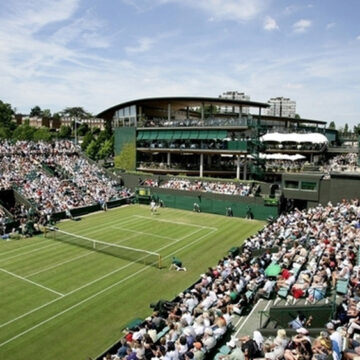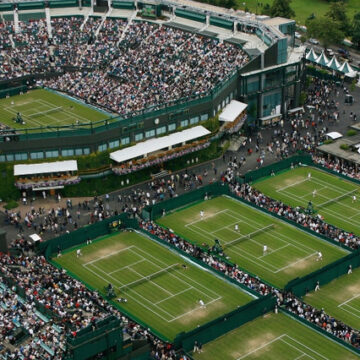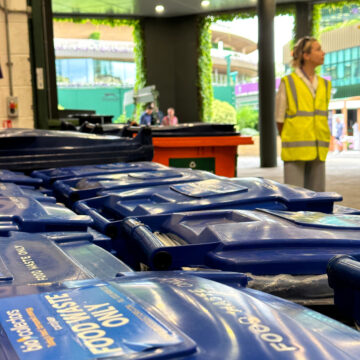Food waste management at Wimbledon championships – Bio Collectors and Bywaters: A powerful partnership





As Head of Responsible Business at Azzurri, I am incredibly proud of the strides we’ve made in reducing our waste, rethinking our operating model and the importance of the food we serve. Through our Recipe for A Better Future we have envisioned a future where our restaurants can continue to grow whilst doing better for our people and planet. We work very closely with our partners to achieve these goals, and our collaboration with Bio Collectors and ADM isn’t just a business partnership, it’s a testament to our Italian tradition of ‘non si butta via niente’ – nothing is thrown away.
With our partners, we have implemented an innovative closed-loop system, turning what was once our food waste into energy, contributing to powering up to 11,000 homes each year. And we did not stop at that. We found a use for the digestate, or simply what’s left after the anaerobic digestion process, using this leftover as natural fertiliser for the fields that grow our wheat. We are passionate about our food; we appreciate how many resources go into making the ingredients we serve, and now we can proudly say that what was once food waste, is now a fundamental part of our sourcing process.
This project exemplifies Azzurri’s commitment to responsible and sustainable business practices. We are thrilled to work alongside our partners in paving the way towards a more sustainable future.
Food Waste Management At Wimbledon
Overview
Wimbledon Championships has always been committed to environmental sustainability. In recent years, the organisers recognised the need to improve their waste management practices, particularly in handling food waste. They sought a solution that would divert food waste from landfill and reduce their carbon footprint.
Background
The primary aim of the Bio Collectors and Bywaters partnership at Wimbledon was to implement a comprehensive and sustainable food waste management system. By combining their expertise and resources, these two organisations strive to minimise the environmental impact of the championships by diverting food waste from landfill and transforming it into valuable resources and contributing to the circular economy.
Solution
Bio Collectors and Bywaters collaborated closely to design and implement an effective food waste management system. The key steps included:
- Infrastructure Setup: Bio Collectors and Bywaters installed dedicated food waste collection points throughout the Wimbledon grounds. These collection points were strategically placed to ensure easy access for staff and vendors. The bins were clearly labelled and accompanied by informative signage, encouraging individuals to separate their waste correctly.
- Collection and Transportation: Bio Collectors deployed their specialised food waste collection vehicles, which are powered by CNG to collect the segregated food waste in the most efficient and hygienic way. On a daily basis, Bio Collectors’ dedicated team would empty the food waste bins, ensuring the strict security and safety protocols are being followed.This attention to detail ensured that all safety requirements were met during this prestigious event. The Bio Collectors’ food processing facility is strategically located within 5 miles of the Wimbledon grounds, reducing congestion and pollution in central London by limiting the distance the waste has to travel.
- Carbon Neutral Collections: Food waste from the championships is collected by Bio Collectors using carbon- neutral Compressed Natural Gas (CNG) vehicles, which are powered by the biogas produced from the very food waste they transport. The use of CNG vehicles is helping to significantly reduce the carbon footprint and the reliance on fossil fuels, making Wimbledon’s collections one of the most sustainable and unique in the market.
- Recycling: The food waste is transported to Bio Collectors’ anaerobic digestion plant in London, where it is processed into renewable energy. The bio-gas produced from recycling the food waste is fed directly to the National Grid and used by local homes and businesses helping to reduce the U.K’s reliance on less sustainable sources. Bio Collectors also create electricity which is used to power their plant and AD process making for a perfect example of the circular economy. The process also produces a nutrient rich fertiliser, called Digestate, which is spread on local farms in Surrey. By providing this to farmers, Bio Collectors are helping to rejuvenate the soil and improve the quality of the crops without the need for damaging and environmentally unfriendly, chemical alternatives
Conclusion
During the Championships, Bio Collectors processed 134 tonnes of food waste, producing 102 tonnes of fertiliser an providing enough gas to power 13 homes per year and electricity to potentially power 18 homes.
The collaboration between Bio Collectors, Bywaters, and Wimbledon Championships exemplifies the successful implementation of a sustainable food waste management system. By diverting food waste from landfill, generating renewable energy, and producing nutrient-rich fertiliser, the partnership has significantly reduced the environmental impact of the Wimbledon Championships.
This case study serves as an inspiration for other large-scale events and organisations to adopt similar sustainable waste management practices.
did you
catch us in...










